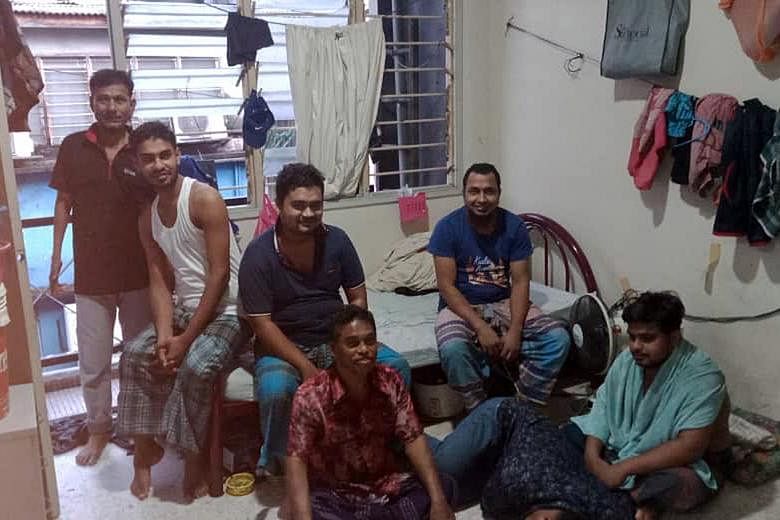Malaysia's movement control order (MCO) has, for most households, meant the annoyance of being cooped up at home, counting the days - at least 28 for now - as the authorities try to limit human contact to curb transmission of the coronavirus.
But for some in the country of 32 million, the stay-home order has resulted in the opposite of the much-vaunted "social distancing" method to "flatten the curve" of infections.
Hundreds of thousands live in low-cost public housing where some units - typically less than 60 sq m in size - have over a dozen people piled into them.
And then there is the unskilled foreign labour - two million legal and anywhere up to double that undocumented - who often share tight spaces so as to reduce cost.
"I'm renting a small room on top of a shop lot in Petaling Jaya with two other friends for RM500 (S$170); the size of the room is roughly 10 sq m," said Bangladeshi wiring technician Shohel Mollah, 29, referring to the satellite city next to Kuala Lumpur. "Two other rooms are also being rented by six others, so there are nine of us."
Despite taking precautions, such as having one person buy groceries for everyone and immediately showering and washing the worn clothes upon returning, they live in fear of contracting the virus. "We keep on asking ourselves, what if one of us contracts it without knowing because we're living in such a cramped place?" he told The Straits Times.
Meanwhile, many poor citizens are also living in cheap housing, with several generations of a family or even several families sharing the space. According to MP Fahmi Fadzil, whose constituency Lembah Pantai is in Kuala Lumpur, low-cost government flats "are very densely populated", with each block having up to 18 floors and 20 units per floor, and two to 12 people per unit.
Even smaller families like Kuala Lumpur City Hall officer Norden Sohed's - five people living in a home of about 60 sq m - find life "scary" in these low-cost flats. "The density of this area is high, I dread imagining if one catches the virus," he told ST.
Mr Norden, 58, is allowed to work from home, but his son has to head out daily as an employee of the postal service.
Concerns of being "too close for comfort" are not limited to just the most vulnerable. Thanks to the advent of "co-living" - where premium apartment units in urban centres are subdivided into several rooms - up to 100 professionals and long-term tourists can share common lounges, kitchens and fitness centres.
Sama+ closed its common areas when the MCO began on March 18. Co-Coon, in Kuala Lumpur, did so last Tuesday.
Co-Coon told ST: "We have increased the frequency of cleaning in all areas. Hand sanitisers are available in common areas for all."
One resident, who wanted to be known only as Adam, said: "Management has been careful. If anyone entering the building has a temperature above 37 deg C, they will get medical assistance first."
Meanwhile, the government yesterday imposed an enhanced movement control order (EMCO) in Hulu Langat, to the east of Kuala Lumpur, after 71 students at a tahfiz, an Islamic school, were found to have Covid-19.
Under the 14-day EMCO up to April 13, residents cannot leave their homes, in a move to contain the virus. Food will be distributed by the Social Welfare Department. This is the second EMCO following one enforced for 14 days to April 9 in two areas in Simpang Renggam, Johor, after a large cluster of cases there.

